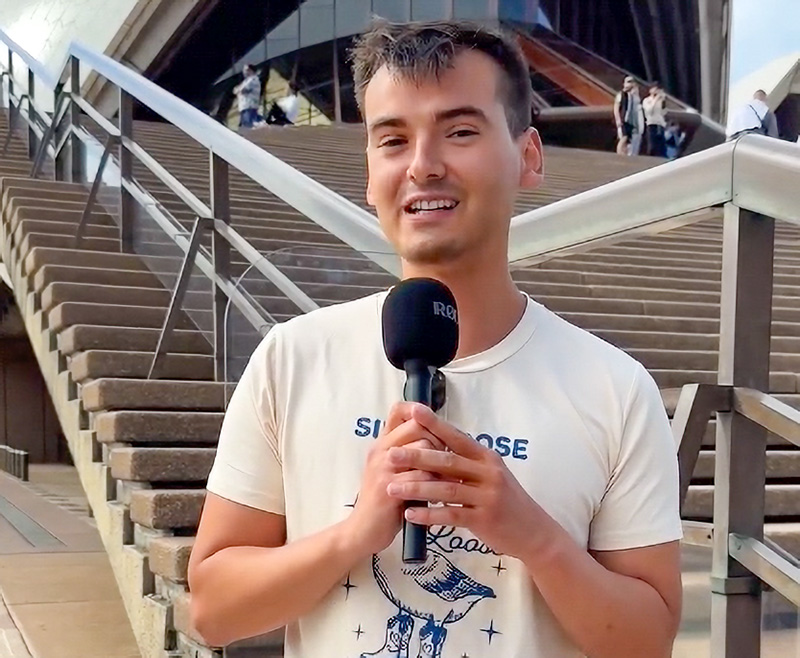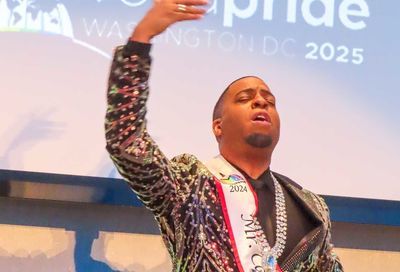Exclusive: Cobalt owner and employees on the sudden shutdown of DC gay club
Owner Eric Little also confirms Cobalt will not have a final farewell party.
By John Riley on March 7, 2019 @JRileyMW

D.C. lost yet another LGBTQ nightlife venue on Tuesday with the announcement that Cobalt had closed its doors for good. Owner Eric Little confirmed the news in a message posted to the club’s Facebook page.
“It’s no secret that the building that housed Cobalt and the adjacent property recently sold,” Little wrote. “With the combination of the sale of the buildings, the start of demolition, costly infrastructure repairs and upgrades that we would need to shoulder to remain open for the short remainder of our lease (without an opportunity to extend the lease) along with a slow decline in sales we decided it was the right time to close the business to focus on our other businesses and some personal family needs.”
Even prior to Little’s announcement, speculation about the club’s fate had swirled for weeks, and hit fever-pitch after a photo shared on Facebook showed the club’s main entrance door with a sign reading “CLOSED FOR WATER PROLBEMS” (sic) posted on the glass.
The official announcement caused shock and surprise on social media, with many expressing their dismay that Cobalt didn’t host a final closing party to let the community say goodbye — like Town Danceboutique did when it closed its doors last summer.
“I’ve been in this industry for several years, and I learned from the founder of JR.’s that you just don’t mix closing parties and alcohol,” Little told Metro Weekly. “It’s just never a good idea. It’s not safe. There are people that do it, and they’re very successful. And there are billions of unsuccessful events like that. And I just did not want to take that risk.”
With regard to the club’s 18-year history since a fire in 2000 forced a rebuild of the property, Little — who had originally planned to open a private club when he took over the property — says he changed his concept during renovations, coming up with an idea for a restaurant on the ground floor, a cocktail lounge in the middle, and a dance club on the top floor, all connected by a grand central staircase.
“Keeping the ‘dance’ vibe of pre-fire Cobalt was important, but so was creating something more upscale and loungey with a better flow,” Little said. “When I launched in October 2001, Cobalt had embossed, poker-style drink chips and focused on martinis and cosmos. Our customers loved it.”
Over the next 18 years, the bar evolved to meet its customers’ desires and new trends, including the addition of theme nights — from Latin nights to drag nights, and even a night for LGBTQ video gamers. But Little notes that two factors were particularly influential in changing the nature of the gay bar industry and the need for LGBTQ-specific spaces: the rise of dating apps and greater acceptance of the LGBTQ community.

“The apps gave people a safe space to meet other people, but they also took away the need to go out in order to meet Mr. or Ms. Right or Right Now,” Little said. “The growing acceptance of LGBTQ people is obviously a huge step forward, but, again, it did change the need for gay-specific bars.”
Little says changes in the industry, as well as competition from other clubs, both gay and non-gay, led to a slow decline in sales. He points to the spread of the LGBTQ population beyond the Dupont Circle and 17th Street neighborhoods as a contributing factor.
“When we first opened, most of the gay community was congregated in a few key areas of the city, and so the clubs were in those areas as well. Now gay people live happily and safely all over the DMV [region], and that’s a great thing.”
Another factor in shuttering the club is that Cobalt, located on the corner of R and 17th Streets NW, was not able to extend its current lease beyond March 2021, meaning there was little sense in continually reinvesting in the space by spending large amounts of money to upgrade its facilities, lighting, HVAC system, and roof.
“Maintaining a facility is very expensive,” Little said via email. “Because we weren’t able to extend our lease, it didn’t make financial sense to keep investing that kind of money. It would be like renovating an apartment that you didn’t own when you knew you were moving in six months.”
According to Little, now that Cobalt has closed, the building that housed the club will be redeveloped by its current owners for residential use. Little, who also owns JR.’s (although not the actual building it’s housed in), will turn his focus to that bar, where he’s worked since it opened in August 1986, and to his family. He is currently figuring out which promotions from Cobalt can be offered at JR.’s moving forward, but hasn’t made any final decisions.

In the Facebook post announcing the club’s closure, Little thanked the customers and staff who contributed to the club during its two-decade run, saying he was proud of Cobalt’s legacy and the people he worked with. Jason Royce, who started as a DJ at the club in 2001 and eventually worked as promotions manager and general manager until he left in 2008, says he’ll miss the camaraderie of the staff.
Royce, who was a customer prior to being an employee, says the thing that attracted him to Cobalt was their Tuesday Retro Night, which tended to bring in a younger crowd. For Royce, who was 16 at the time and managed to get in without being carded (in the club’s pre-Little iteration), Cobalt offered a chance for him to explore the gay community and find his identity.
“That was the first club I ever went to when I was coming out,” he says. “My first circle of friends was made at Cobalt. I’d come down from Maryland, and drive two hours every single week. I’d come every week, whether I had the flu, a broken ankle, snow — nothing could stop me.”
Current General Manager Brian Blanchard, who has worked at the nightclub for the past decade, says staff began to sense the bar would eventually close after the building was sold last August. Nonetheless, Blanchard says that working at Cobalt has been “a blast.”
“It’s had its up and downs, but I’ve met so many amazing people — DJs, entertainers — and am still great friends with all of them. We’ve had amazing staff parties there as well,” he says. “It’s always been a fun time.”
“Senate Twink” Says Video Sex Scandal Drove Him to Flee U.S.
Aidan Maese-Czeropski, the gay former Senate staffer fired at the center of an online sex scandal, is much happier living in Australia.
By John Riley on April 23, 2025 @JRileyMW
Aidan Maese-Czeropski, the former Capitol Hill Senate staffer fired for allegedly filming and sharing video of a sexual encounter in a U.S. Senate hearing room, says the fallout from the scandal traumatized him, prompting him to leave the country and start a life anew abroad.
Maese-Czeropski, infamously known online as the "Senate Twink," told Gay Sydney News that the sex tape scandal led to emotional turmoil, requiring temporary hospitalization.
"Mentally, I spent a little bit in the psych ward after the fact because it was just… it’s overwhelming to realize and to know that tens of millions of people literally despise you," he told the news outlet.
Gay Nightclub Bans All MAGA-Related Attire
Log Cabin Republicans balk at the Sacramento nightclub's ban on MAGA gear after patrons complained about one man's pro-Trump cap.
By John Riley on March 23, 2025 @JRileyMW
A popular LGBTQ nightclub in Sacramento, California, is prohibiting patrons who wear MAGA-related attire from entering the establishment.
Badlands, in the city's Lavender Heights district, announced the policy on social media. Management claimed they were motivated to impose the ban after a patron wore a MAGA hat while in the bar, leading some patrons to complain that they were made to feel uncomfortable and unsafe.
"At Badlands Sacramento, we are committed to creating a space where the LGBTQ+ community and our allies feel safe, welcomed, and respected," TJ Bruce, the bar's owner, wrote in a social media post. "Recently, a guest entered the bar wearing MAGA attire, which led to some discomfort among patrons.
Gays in ‘Greatest Danger I Have Ever Seen’ says Russell T Davies
The "Doctor Who" showrunner warns that Donald Trump's election is a symptom of a massive and hateful global anti-LGBTQ backlash.
By John Riley on March 19, 2025 @JRileyMW
Russell T Davies, creator of the British TV series Queer as Folk and the current showrunner of the BBC phenom Doctor Who, says gay society is facing dire peril ever since the presidential election of Donald Trump in November, 2024.
"I'm not being alarmist," Davies told the British newspaper The Guardian. "I'm 61 years old. I know gay society very, very well, and I think we're in the greatest danger I have ever seen."
Davies said the rise in anti-LGBTQ hostility is not limited to the United States, where Trump has signed various anti-LGBTQ executive orders, many geared to diminish and seemingly eradicate the transgender community.
Support Metro Weekly’s Journalism
These are challenging times for news organizations. And yet it’s crucial we stay active and provide vital resources and information to both our local readers and the world. So won’t you please take a moment and consider supporting Metro Weekly with a membership? For as little as $5 a month, you can help ensure Metro Weekly magazine and MetroWeekly.com remain free, viable resources as we provide the best, most diverse, culturally-resonant LGBTQ coverage in both the D.C. region and around the world. Memberships come with exclusive perks and discounts, your own personal digital delivery of each week’s magazine (and an archive), access to our Member's Lounge when it launches this fall, and exclusive members-only items like Metro Weekly Membership Mugs and Tote Bags! Check out all our membership levels here and please join us today!
The Magazine
-
Most Popular
 "Senate Twink" Says Video Sex Scandal Drove Him to Flee U.S.
"Senate Twink" Says Video Sex Scandal Drove Him to Flee U.S.  Abigail Spanberger Backed by HRC in Virginia Governor Bid
Abigail Spanberger Backed by HRC in Virginia Governor Bid  Gay Army Reserve Officer in Uniform Sex Video Scandal
Gay Army Reserve Officer in Uniform Sex Video Scandal  'Boop! The Musical' Is Broadway’s Happiest Surprise
'Boop! The Musical' Is Broadway’s Happiest Surprise  A Potent (and Pricey) 'Good Night, And Good Luck'
A Potent (and Pricey) 'Good Night, And Good Luck'  Hugh Bonneville Talks 'Downton Abbey,' 'Paddington,' and 'Vanya'
Hugh Bonneville Talks 'Downton Abbey,' 'Paddington,' and 'Vanya'  Lesbian Firefighter Awarded $1.75 Million in Lawsuit
Lesbian Firefighter Awarded $1.75 Million in Lawsuit  Nick Cave: The Wizard of Art
Nick Cave: The Wizard of Art  'Porn Star University' Started by Gay-for-Pay Creator Andy Lee
'Porn Star University' Started by Gay-for-Pay Creator Andy Lee  Ex-Mormon Josiah Ryan Spreads Love as 'Gay Jesus' in Utah
Ex-Mormon Josiah Ryan Spreads Love as 'Gay Jesus' in Utah
 "Senate Twink" Says Video Sex Scandal Drove Him to Flee U.S.
"Senate Twink" Says Video Sex Scandal Drove Him to Flee U.S.  Abigail Spanberger Backed by HRC in Virginia Governor Bid
Abigail Spanberger Backed by HRC in Virginia Governor Bid  Lesbian Firefighter Awarded $1.75 Million in Lawsuit
Lesbian Firefighter Awarded $1.75 Million in Lawsuit  Nick Cave: The Wizard of Art
Nick Cave: The Wizard of Art  Trans Women Not Legally 'Women,' UK Supreme Court Rules
Trans Women Not Legally 'Women,' UK Supreme Court Rules  Chef’s Best Is A Culinary Extravaganza For A Cause
Chef’s Best Is A Culinary Extravaganza For A Cause  This Week's Advertisers: Nick Cave - April 17, 2025
This Week's Advertisers: Nick Cave - April 17, 2025  Off-Broadway's 'All the World’s A Stage' Is Tender, Timely, and True
Off-Broadway's 'All the World’s A Stage' Is Tender, Timely, and True  'Boop! The Musical' Is Broadway’s Happiest Surprise
'Boop! The Musical' Is Broadway’s Happiest Surprise  Naples Pride Sues City Over Drag Show Ban
Naples Pride Sues City Over Drag Show Ban
Scene
Metro Weekly
Washington's LGBTQ Magazine
P.O. Box 11559
Washington, DC 20008 (202) 638-6830
About Us pageFollow Us:
· Facebook
· Twitter
· Flipboard
· YouTube
· Instagram
· RSS News | RSS SceneArchives
Copyright ©2024 Jansi LLC.











You must be logged in to post a comment.